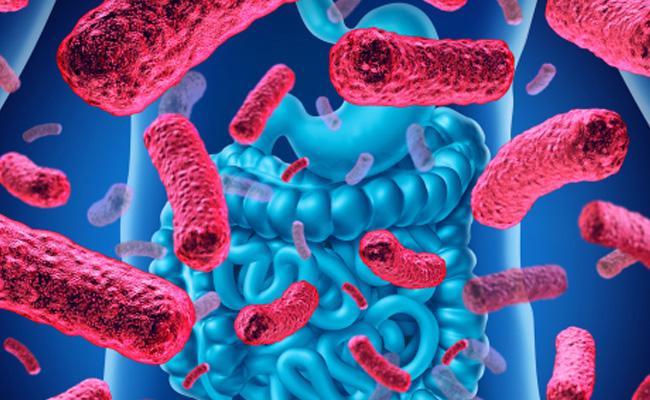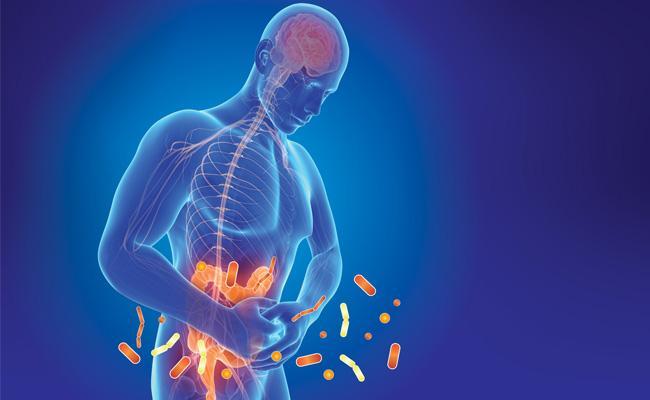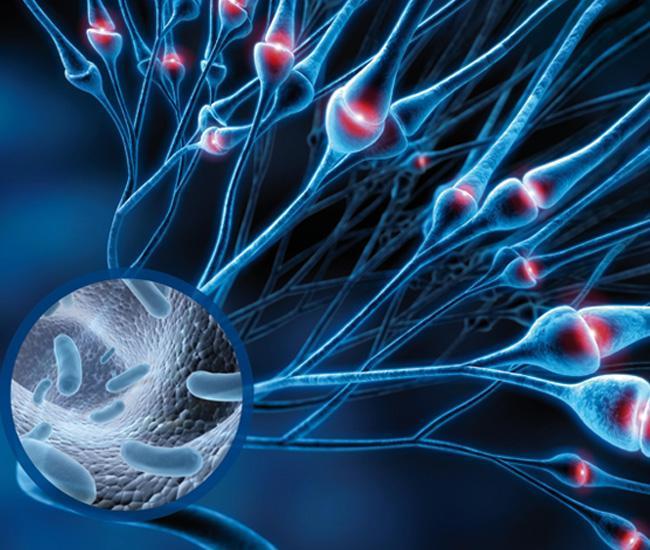Digestion and vitamin synthesis
The intestinal microbiota plays a direct role in digestion, in particular helping different components of food (carbohydrates, lipids, proteins and fibres) to break down and be assimilated, for instance by supplying enzymes that our body lacks.
Animal experiments have shown that axenic mice (i.e. mice with no intestinal microbiota) need 20 - 30% more energy than do normal animals.
The intestinal microbiota is also involved in synthesizing vitamin K and some group-B vitamins, and is active in calcium and magnesium metabolism.
Intestinal physiology and metabolism
Work with axenic animals has shown that the absence of an intestinal microbiota changes the characteristics and functioning of the enterocytes, the cells of the intestinal mucosa. In axenic animals, the enterocytes are renewed less quickly: the layer of protective mucus covering them becomes thinner, and there is reduced vascularization1 and intestinal peristalsis2.
These changes influence the metabolism and also infections, since rapid enterocyte renewal and peristalsis, together with the barrier effect of the intestinal mucosa, prevent pathogens from gaining a hold.

Development and maturation of the immune system
The intestinal microbiota plays an essential role in the development and functioning of the intestinal immune system. Studies show that the immune systems of axenic mice are immature and incomplete. These anomalies disappear if the mice are inoculated with microbiota from normal mice.
Protection against pathogens
In addition to its role in maturing and modulating the immune system, the intestinal microbiota provides direct protection against pathogenic micro-organisms. Bacteria naturally present in the intestine (also known as resilient or commensal flora) can secrete antimicrobial substances that counter other micro-organisms or bacteria. They also compete with pathogenic bacteria for the available nutrients and space and thus help prevent their proliferation.
Proven involvement in some pathologies
All the studies and research into the microbiota prove that it influences the appearance of several pathologies.
An imbalance of some bacterial species in the microbiota has been described in people suffering from chronic inflammatory bowel disease (CIBD) and irritable intestine disease (also called irritable bowel syndrome).
Disturbances of the intestinal microbiota have been demonstrated in people suffering from diabetes, obesity, allergies, and also from some forms of cancer.

More recently, research has shown that changes to the intestinal microbiota can act on the central nervous system and affect the nervous system. The intestinal wall in fact contains a complete set of nerve fibres making up the enteric nervous system, in continuous communication with the central nervous system: this is referred to as the “gut-brain axis”, with the intestine being our “second brain”.
Several studies show that the intestinal flora are out of balance (suffer disbiosys) during some neurological pathologies, suggesting that the microbiota is involved in the onset of autism, schizophrenia, anxiety, depression and bipolar disorders, and also of neurodegenerative diseases such Alzheimer’s or Parkinson’s.

1. Vascularization: formation of blood vessels that nourish the cells making up a particular tissue.
2. Intestinal peristalsis: contractions of the muscles of the intestine, important in moving its contents forward. It is also known as intestinal motricity
Sources :
- Dossiers d’information Inserm, Microbiote intestinal (https://www.inserm.fr/information-en-sante/dossiers-information/microbiote-intestinal-flore-intestinale)
- Les fondamentaux de la pathologie digestive/Chapitre 13 Microbiote et immunité intestinale. Elsevier Masson Octobre 2014 (https://www.snfge.org/sites/default/files/SNFGE/Formation/chap-13_fondamentaux-pathologie-digestive_octobre-2014.pdf)
- Frédéric Barbut, Francisca Joly. Le microbiote intestinal : équilibre et dysbiose. HEPATO-GASTRO et Oncologie digestive, vol. 17 n° 6, novembre-décembre 2010 (http://www.jle.com/download/hpg-286920-le_microbiote_intestinal_equilibre_et_dysbiose--Wv59Un8AAQEAAAFNnSUAAAAA-a.pdf).
- C Landman, E Quévrain. Le microbiote intestinal : description, rôle et implication physiopathologique. La Revue de médecine interne (2016) 37 : 418-423(http://acces.ens-lyon.fr/acces/thematiques/immunite-et-vaccination/thematiques/virus-et-immunite/utiles-microbiote/pdf/1-s2.0-S0248866315011273-main.pdf).
